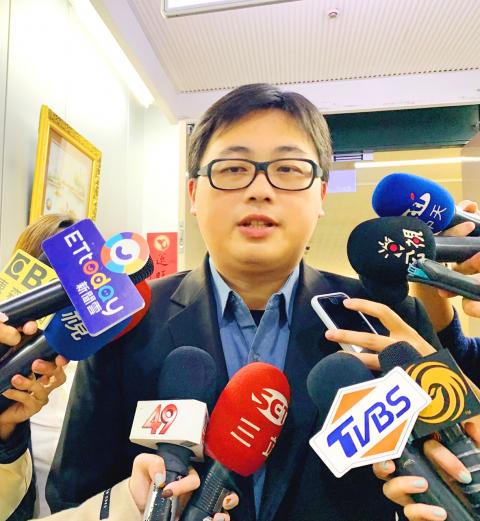Taipei Mayor Ko Wen-je (柯文哲) is scheduled to visit the US in March, sparking speculation that he is preparing to run for president in 2020.
US officials have arranged for Ko — who is to be sworn in today for his second term — to visit in March so that they can get to know Taiwanese political leaders, sources familiar with the matter said.
Taipei City Government spokesman Liu Yi-ting (劉奕霆) on Sunday confirmed that Ko would visit the US in the spring, but added that the itinerary was still being planned.

Photo: Chen Pei-yao, Taipei Times
The US does not publicly discuss people’s visa applications due to privacy laws, American Institute in Taiwan (AIT) spokeswoman Amanda Mansour said.
The city government has not requested help from central government agencies that handle foreign affairs, a national security official said on condition of anonimity, adding that it is normal for the heads of local governments or political parties to make overseas visits.
After he focused on relations with China during his first term, Ko planning to visit the US shortly after the start of his second term makes it appear he is sending a message to the US that he is not pro-China, Democratic Progressive Party (DPP) Legislator Wang Ting-yu (王定宇) said on Sunday.
Visits to the US by a Taipei mayor are associated with plans for a presidential bid, Wang said, adding that Ko’s trip leads people to this conclusion even if it is not his intention.
The DPP did not do well in last month’s elections, so politicians are emboldened, he said.
Wang said that over the next few months, many politicians, such as Chinese Nationalist Party (KMT) Chairman Wu Den-yih (吳敦義) and New Taipei City Mayor Eric Chu (朱立倫), would likely visit the US or China.
It is worth observing whether Ko’s overseas visit carries the same significance as the visits of other politicians, he said.
Ko’s intention can be discerned through his itinerary, DPP Legislator Chiu Chih-wei (邱志偉) said.
Surveying municipal infrastructure, exchanging ideas on medical practice, participating in events hosted by overseas Taiwanese communities or attracting businesses to Taipei would be in line with Ko’s position as mayor, Chiu said, but added that visiting diplomatic and defense think tanks or the US Department of State would not.
In March 2016, Ko made his first trip to the US as mayor, leading a delegation of city officials and business leaders to San Francisco, Phoenix and Los Angeles to learn from US businesses.
Speculation about whether Ko might launch a 2020 presidential bid re-emerged after his re-election and he reiterated in the opening address to the Taipei-Shanghai forum on Wednesday last week that “the two sides of the Strait are one family.”
At a news conference on Thursday last week, Ko spoke of the need for a new term to describe cross-strait relations due to the so-called “1992 consensus” and “one family” having acquired bad connotations.
The so-called “1992 consensus,” a term former Mainland Affairs Council chairman Su Chi (蘇起) in 2006 admitted making up in 2000, refers to a tacit understanding between the Chinese Nationalist Party (KMT) and the Chinese government that both sides of the Strait acknowledge there is “one China,” with each side having its own interpretation of what “China” means.

The manufacture of the remaining 28 M1A2T Abrams tanks Taiwan purchased from the US has recently been completed, and they are expected to be delivered within the next one to two months, a source said yesterday. The Ministry of National Defense is arranging cargo ships to transport the tanks to Taiwan as soon as possible, said the source, who is familiar with the matter. The estimated arrival time ranges from late this month to early next month, the source said. The 28 Abrams tanks make up the third and final batch of a total of 108 tanks, valued at about NT$40.5 billion

Travel agencies in Taiwan are working to secure alternative flights for travelers bound for New Zealand for the Lunar New Year holiday, as Air New Zealand workers are set to strike next week. The airline said that it has confirmed that the planned industrial action by its international wide-body cabin crew would go ahead on Thursday and Friday next week. While the Auckland-based carrier pledged to take reasonable measures to mitigate the impact of the workers’ strike, an Air New Zealand flight arriving at Taipei from Auckland on Thursday and another flight departing from Taipei for Auckland on Saturday would have to

A group from the Taiwanese Designers in Australia association yesterday represented Taiwan at the Midsumma Pride March in Melbourne. The march, held in the St. Kilda suburb, is the city’s largest LGBTQIA+ parade and the flagship event of the annual Midsumma Festival. It attracted more than 45,000 spectators who supported the 400 groups and 10,000 marchers that participated this year, the association said. Taiwanese Designers said they organized a team to march for Taiwan this year, joining politicians, government agencies, professionals and community organizations in showing support for LGBTQIA+ people and diverse communities. As the first country in Asia to legalize same-sex

MOTIVES QUESTIONED The PLA considers Xi’s policies toward Taiwan to be driven by personal considerations rather than military assessment, the Epoch Times reports Chinese President Xi Jinping’s (習近平) latest purge of the Chinese People’s Liberation Army (PLA) leadership might have been prompted by the military’s opposition to plans of invading Taiwan, the Epoch Times said. The Chinese military opposes waging war against Taiwan by a large consensus, putting it at odds with Xi’s vision, the Falun Gong-affiliated daily said in a report on Thursday, citing anonymous sources with insight into the PLA’s inner workings. The opposition is not the opinion of a few generals, but a widely shared view among the PLA cadre, the Epoch Times cited them as saying. “Chinese forces know full well that